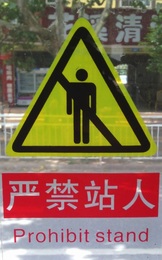
I saw this sign on a bus a week ago. A nice bit of Chinglish I thought, and decided it would be a good idea to show it to my older students and ask them to analyse why it was wrong and suggest a corrected version. "Standing Prohibited" is what we'd normally expect to see, right? But then I started to work out what type of words "standing" and "prohibited" were in this simplest of sentences....
Well, "Prohibit stand" is clearly wrong. Both words are infinitive verbs and you can't make a sentence from two base verb forms (unless one is an auxiliary, of course, but that's another story as neither is here). However, in "Standing Prohibited", "standing" looks like a (gerund) verb and "prohibited" also looks like a (past participle) verb. After huge and animated discussions with the other foreign teachers, we suspect that this tiny sentence is a passive form of imperative where the gerund verb's function is as a noun, since it being acted on by the main verb, while the past participle verb's form is as an adjective, since it describes the gerund subject ...and if you're still following our grammatical logic at this point, a job awaits you at Robert's School! Who'd have thought a simple two word sentence could be so complex?

